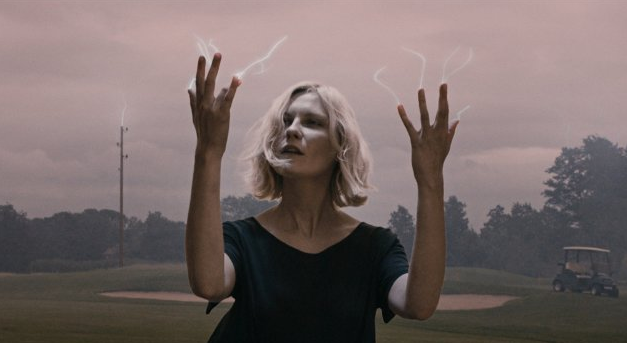Melancholia
Lars von Trier doesn’t like his film Melancholia. He says he is actually a little ashamed of it, finding it bombastic, slick, and Wagner’s music overwhelming. That is just the von Trier way. After the fact, he only sees problems, as he did at the last Cannes Festival after his much reviled pro-Hitler rant of which he still feels the sting despite having apologized a hundred times.
Regarding his assessment of Melancholia, the Danish director is wrong. His film is extraordinary. With von Trier’s previous effort, Antichrist, it shares provocation, peculiar and highly effective cinematography (though the jerkiness of hand-held can prove irritating), and actresses that break out of their shell to give the performance of a lifetime (Charlotte Gainsbourg won best female interpretation award at Cannes in 2009 as did Kirsten Dunst this past May). Melancholia diverges, however, in giving off a powerful sense of doom and agitation, underlined by the far-off rumbling of the monster planet drawing closer and closer, bringing with it the annihilation of ours.
After a prologue of stunning images accompanied by the overture from Tristan and Isolde comes the first part, called Justine. Justine (Dunst) is a bride off to her wedding with her groom, Michael (Alexander Skarsgård). The ridiculously long white stretch limo has difficulty negotiating the winding country road. When the couple finally makes it, two hours late, it is greeted by Justine’s level-headed, drabber sister, Claire (Gainsbourg), nervous at having had the guests wait so long. She feels responsible as she organized the classic entertainment wedding funded by her husband, John (Kieffer Sutherland) at the golf resort which serves as their home.
As the evening progresses, the bride shows increasing signs of distress. In random and irresponsible actions, she keeps leaving the groom stranded, removing herself from the celebration to soak in a bathtub or drive off in a golf cart. As Michael carries her into the wedding chamber, she starts to undress then changes her mind and once more disappears. It takes a while for the desolate groom to finally understand that this wedding is on the wrong track and leave.

Lars Von Trier giving directions to Kirsten Dunst
Carefully scripted by Lars von Trier (does one ever stop to think how gifted a director must be who also writes the story?), almost every scene is the occasion of amazingly inventive and spectacular images, giving off a dreamlike Fellinian aura without the element of grotesque that the Italian maestro liked to infuse. There is also an obvious influence of Dogma, with the heaviness and the unpleasantness that came off in films from that school such as Celebration—the rudeness of the mother (Charlotte Rampling), the clueless father (John Hurt)—and the fact that the wedding in Melancholia practically takes place in real time.
The second part is called Claire, for the sister. Claire brings home Justine, now deep in depression, makes meatloaf, tries to keep her clean and fed, to shake her back to the real world. Claire’s mission is to organize life around her, to make sure that her family lacks for nothing, that she spends time with her little boy, that the horses get their exercise and the resort functions as it should.
But the unnerving background is that a huge planet, until now hidden behind the sun, is ominously moving toward the earth. The internet is rife with theories, will it hit, will it pass us by? The protagonists react in very different ways. Justine, the walking wounded, is calm and collected, as if relieved that our world, which she calls evil, is ending. Claire, the practical sister, is terrified—though she tries to hide her panic from her husband—and trolls the internet to read the latest about the errant planet.
As for the husband, John, as long as he believes the planet to be unthreatening, he is thrilled by the event. With his son, he watches Melancholia through his telescope and reassures his wife while secretly stacking water and flashlights. When he realizes that Melancholia is moving closer instead of away, he decides on a different course.
One can’t help wondering about the name of the monstrous sphere, Melancholia. We are used to our planets bearing the names of, say, mythological gods—Pluto, Saturn, Neptune, Juno—not those of human moods or conditions. Could it be that Melancholia, blue in color as it happens, is in fact an illusion, a nightmare depiction of what profound depression is like? Could the deep, steady, rumbling sound be that of our shattered subconscious and not that of an inexorable external force bent on our annihilation?
Melancholia is often compared to Malick’s Tree of Life which won the Palme d’Or at the same festival. How a simplistic, ponderous, and incoherent there’s-sunshine-behind-the-darkest-cloud and I’m-stronger-for-having-survived-the-bruises piece like Tree of Life could ever hope to compare to von Trier’s profound metaphysical reflection is beyond this critic.
Perhaps the jury, headed by de Niro, was won over by the pretty colors of—by the way, what was that twenty-minute sequence that drew more than a few guffaws from the audience? the big bang moment of creation? life developing in a womb? Or was the film rewarded because Malick’s reclusiveness and few and far between films automatically earn him reverence. But the two films have nothing in common. The first is pretentious, the second carries superior power. At the end of Melancholia, the audience usually prompt to gather belongings and head for the exit sat in stunned silence.
SEE ALSO: trailer; controversy







